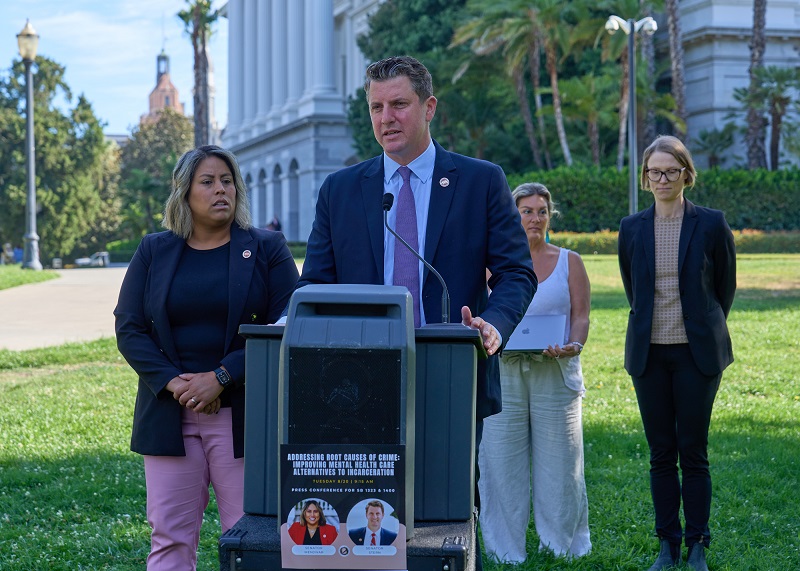Addressing Root Causes of Crime: Improving Mental Health Care Alternatives to Incarceration
LA-area Senators advance bills to prevent mentally ill people in jail from being released to streets without care

Sacramento, CA – (08/20/24) – Lawmakers, medical professionals, and family advocates came together to call for urgent reforms to prevent people with severe mental illness who are arrested for misdemeanors and felonies from being released from jail without mental health care. San Fernando Valley State Senators Henry Stern and Caroline Menjivar, along with leading experts, are championing Senate Bills 1400 and 1323 to deliver better care to this small but highly significant population.
SB 1400 and 1323 build on lessons learned from Los Angeles, where recidivism rates have doubled since 2021 for people suffering from mental illness who are arrested for misdemeanors and felonies.
Around five people every day in Los Angeles County have their cases dismissed and are free to leave jail without treatment or any requirement to get back on their medication, despite the judge finding them incompetent to stand trial. In 2021, the rate of rearrest within six months was 15.9%. In 2022-23, after Stern's bill SB 317 allowed for counties to release these individuals without care, the six-month rearrest rate doubled to 31.4%, according to the LA County Office of Diversion and Reentry.
Stern said of SB 1400, “We need to scale the care-first models that are working in LA, so we stop recycling people through the jails and back onto the streets without care."
“Right now, thousands of the most vulnerable Californians are being arrested, held in jail without medical treatment, only to be released onto the streets in worse condition,” Stern said.
Long-term Care
Senator Caroline Menjivar, author of SB 1323, highlighted the need to expand mental healthcare for individuals who have committed felonies. Her bill, SB 1323 (FIST), aims to strengthen the role of courts in helping those with serious mental illnesses. “To better serve the interests of justice for system-impacted Californians with the most serious mental illnesses, SB 1323 will implement recommendations from the Committee on Revision of the Penal Code, and other expert panels, to modernize our Incompetent to Stand Trial process. The bill provides judges with tools to quickly identify people with developmental disabilities and other special needs, and to place people with severe mental illness into appropriate long-term care,” said Senator Menjivar.
Expert Testimonies
Dr. Emily Wood, the former supervising psychiatrist in the Twin Towers of LA County Men’s Central Jail, noted the need to close the loopholes left in Stern’s SB 317 with his follow-on measure SB 1400. “It is unacceptable to detain individuals for the crime of being seriously mentally ill and not provide the treatment they need and deserve,” Dr. Wood said. She stressed that SB 1400 is essential for ensuring that these defendants receive timely and appropriate care, which is critical for reducing recidivism and improving long-term outcomes by helping us move away from using county jails as mental health facilities.
Dr. Susan Partovi, a former clinician in LA County’s women’s jail, who now practices street medicine with Homeless Health Care LA, echoed this sentiment. "We need to stop discriminating against those who suffer from severe mental illness and, most importantly, provide psychiatric care instead of jail time.” Dr. Partovi, author of Renegade MD: A Doctor's Stories from the Streets, spoke about her work with severely mentally ill women in LA County jails and emphasized the necessity of quality care for those suffering from severe mental illness, “Treat, don't incarcerate. SB 1400 is a vital step in that direction.”
A Mom’s Fight for Her Daughter
E. Kaino Hopper from Sacramento has a daughter whose life fell apart after she developed schizophrenia in her twenties and quickly spiraled into homelessness, drug abuse, and crime. After several misdemeanor arrests, where her daughter was put in jail, denied her medications or any treatment, and released, she was recently arrested for a felony. Finally, because of that felony charge, she is now back on her medication and in treatment through Sacramento County jail’s system, while her trial is pending. She was found incompetent to stand trial, which has allowed her to be moved from jail into a mental health facility.
Hopper detailed the challenges of navigating a system that often seems more focused on incarceration than care. “My daughter reminds me she did not choose these illnesses...she asks me why didn't someone try to help me sooner?” she said, advocating passionately for the passage of both SB 1400 and SB 1323. “We want our loved ones to have the right to treatment for these biological brain disorders...we encourage legislators to support these vital bills because they are the keys to individualized treatment that can prevent recidivism, reduce costs, and reduce human harm. This is what families like mine ask for support for.”
As California continues to grapple with both the mental health crises playing out on its streets and in its jails, while a new funding push for behavioral health beds and housing for people with mental illness under Prop 1 rolls out, the passage of these bills could mark a significant turning point, offering hope and support to those who need it most.
VIDEO: https://www.youtube.com/watch?v=MJnYbbtmCbQPHOTOS: https://photos.app.goo.gl/EuLikpHX7kmGpCtg9